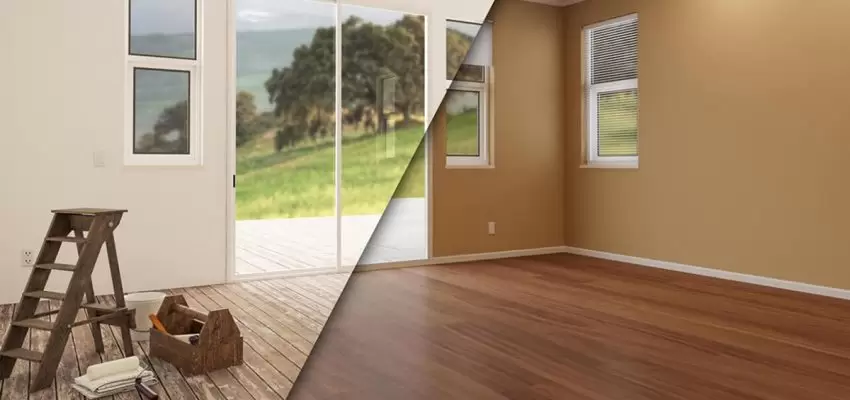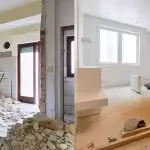Home renovation is one of the most exciting ways of changing the living space – it can be modernizing an ageing kitchen, including a luxurious bathroom, or expanding your whole home. You are in the driving seat to personalize your space and add value to it. But with all that information, people find themselves prone to a bunch of common myths that can lead to costly mistakes and frustrations.
Post your Requirement
Sadly enough, however, many homeowners begin remodeling with a series of misconceptions that can be fatal to the very plans they are trying to bring to life. The sad truth is that not all renovations are as easy or inexpensive as might be postulated by some elements. So, if you want your remodel to be a success, you’ve got to separate fact from fiction.
In the blog post, we continue to discuss five of the most popular myths in home remodeling and show you how to avoid them. Having the right knowledge will set you ready to grapple with that next project without undue stress or surprises.
Top Common Home Remodeling Myths And How To Debunk Them
Myth 1: Home Remodeling is Always Expensive
The biggest myth homeowners face is the assumption that remodeling is always expensive. It is easy to believe that major expenditures in remodeling include high-end materials, professional contractors, and complete home overhauls. While this is true for some remodels, the reality of home renovations is that not all of them need to come at a cost.
Why Is It A Myth?
Home remodeling costs can be flexible and will change with your criteria, like the scope of the project, what materials you are using, and the size of the space being renovated. Even smaller updates can be done on a budget while bringing a big impact. Repainting walls, changing outdated lighting or putting on new hardware on the cabinet is a modest upgrade that can make your house look better and newer.
This further creates the notion of “price is a good indicator of quality”. For example, you need not spend money on granite countertops or hardwood flooring to make your home glamorous. You would find lots of alternatives that will provide the same effect on your space without spending the money on those.
How To Avoid?
- Set A Clear Budget: Start by determining how much you want and can afford to spend. Then consider materials, labour, and the cost of any permits necessary, and add 10 to 20 per cent to cover contingencies.
- Prioritize Your Needs: Target areas of your home where improvements will have the greatest potential impact. Example: Even a couple of modest updates in your kitchen or bathroom might result in an incredible return on investment without gutting the whole space. Consider what changes will add value or enhance functionality the most.
- Be Budget-friendly: Use less expensive options of finishes: Change expensive natural stone countertops to quartz or even laminate that can be just as aesthetically pleasing. Vinyl flooring is another excellent alternative to hardwood, and it is easy to maintain.
- Do It Yourself When You Can: If you are a DIY type, take on minor projects for yourself. Jobs that involve painting, installing new light fixtures or even a re-do of the landscape can save a lot in labour costs.
Home remodeling does not have to incur a lot of money so long as you have planned well, starting with a budget and smart decisions.
Myth 2: You Can Complete A Home Remodel Quickly
The most common myth is the speed with which it gets done. Most homeowners think of the work on their home as finishing up quickly once their design is finalized. Very often, it does not hold true to their expectations since finishing a renovation is never quick, which may lead to frustration in the end.
Why Is It A Myth?
Remodeling projects tend to take longer than anyone thought they would for some concrete reasons. Remodels contain very many stages such as design, demolition, construction, and finishing work. Each takes so much time, especially with the involvement of professionals working on them to fit within the time suited to other projects.
There are also often delays that surface in such a construction process. A contractor may discover hidden issues such as obsolete plumbing or wiring, or worse, mold behind the walls. Such issues can add up to the time of the project, and you may need further approvals or permits when major changes are involved.
Even when construction is finished, the “finishing touches” in the form of painting, tiling, and fixture installation add days or maybe even weeks to the timeline.
How To Avoid?
- Create Realistic Timelines: Talk to your contractor regarding the realistic timeframe. It will take weeks or months, depending on the complexity. Don’t expect everything to finish in just days.
- Expect Some Setbacks: Even the best-planned schedule encounters some unsuspected issues. Whether it’s a setback on the materials themselves or something hidden behind the walls, you can bet that there will be a few. Add 10-20% to your initial timeline to help cushion any potential delays that arise.
- Use Pros: Pros such as seasoned contractors know the process and, therefore can make a proper estimate. They can handle sub-contractors and avoid unnecessary delays. An older project manager will ensure that work will stay on track.
- Be Flexible: No matter how much significance timelines hold, try to be as flexible and patient. Wait will pay off and one might be in such a hurry to get a remodel done, which may compromise the work done.
Home remodeling is a long process that will require all your time and patience with a heart of understanding. Then, if you set realistic expectations from such a process, you could keep your cool without getting unnecessarily stressed out during the renovation itself.
Myth 3: No Permits Required For Remodeling Jobs
Many homeowners believe that they don’t need permits for minor renovations or that it’s only the major construction work that requires having permits. However, what’s the truth about renovation projects, which really do not have to be done with a permit? More and more of them actually fall into the category of required to secure a permit prior to beginning.
Why Is It A Myth?
Any work that affects the safety or the infrastructure of your home will require permits. Examples of these projects would include rewiring an electrical system, installing pipes, rebuilding load-bearing walls, and even major cosmetic overhauls: any new windows or a new roof. Without those permits, the work might not meet the requirements of the building code, leading to potential future problems.
If you ever plan to sell your house, unpermitted work may be flagged during home inspection. It can further delay the sale or sometimes even result in undoing changes you made. What’s more, if, due to such unpermitted work, there is some problem such as a fire caused due to faulty electrical work, your insurance company will not cover the damages.
How To Avoid?
- Check The Local Regulations: Always ask the building authority or your local government to see if there’s a permit needed for the project. Even minor changes-installing a new kitchen sink, or changing windows, for instance, require a permit, depending upon local regulations.
- Use pros: A professional contractor is aware of building codes and required permits where he/she is. This way, they will know they have all the documents in order and work accordingly.
- Save From Getting Fines: There will always be a time wherein a failure to get right documents or permits will bring you some fines or worse. It is less of a headache in the beginning to go through the appropriate process.
Before you start the renovation process, make sure that you are within your local regulations. Doing this will save you much time and money, and your home will be safe and up to code.
Myth 4: Do It Yourself = Money Savings
DIY remodeling is one of those good ways to save money on home improvement projects. Why? Because if you can paint, place new floors, or even update cabinets, you save labour costs. But not every DIY project will save money in the long run and will indeed create more expenses and headaches if they go wrong.
Why Is It A Myth?
Sure, painting, lawn work, or hardware changes are doable DIY jobs. The bigger, more technical tasks- electric, plumbing, or structural amendments prove dangerous if attempted in the absence of proper training. Mistakes in these areas can be costly to repair, create safety hazards, and codes can be violated.
In addition, DIY projects usually take a lot longer than you think they will. If you were to attempt doing remodelling on your own, for example, perhaps you will be working every weekend for months of weekends until you get it done; likely, it will not be at the professional level of a contractor, which can frustrate and depress outcomes.
How To Avoid?
- Know Your Limits: Before you start any DIY project, find out if you have the skills and tools to successfully complete it. Electrical work, plumbing, or major construction must be done by a licensed professional.
- Consider Your Time: DIYs can take much longer than anticipated, especially when you have competing demands like work and family. Does the time spent on a particular project warrant the savings? It is often the smart decision to hire professional services as they can offer pre-defined timelines and complete tasks without any potential delays.
- Professional Services in Heavy Construction Work: Technical jobs or structural work in your remodeling? Get that done by the only licensed professional contractors. This is because they will ensure your job is safe, efficient, and done according to the relevant codes.
If you want to save money, you can try minor tasks. Leave more complicated jobs to experts.
Myth 5: All Home Remodels Will Add Significant Value To Your Home
All of these techniques are applied to increase the value of a home when it is time to sell, however, the following should not be overlooked: not all home improvements will generate a good ROI, and some may even be used against you in certain circumstances to lower the selling price of your home.
Why Is It A Myth?
While renovations definitely do add value to a property, not all jobs are created equal in the marketplace. For example, those customized upgrades, such as a home theatre or luxury swimming pool, will appeal to fewer potential buyers, at least in any market where that particular feature is not in high demand.
However, renovative upgrades on functionality and updating a simple house room such as the kitchen or bathroom usually tend to be much better investments. Such renovations usually have increased ROI since they tend to attract more buyers.
How To Avoid It?
Tend to follow the local market trend. Know what the customers are looking for in your local market. Work with an agent to know the improvement that would give the maximum ROI in your locality.
- Functional Update: Not each update needs to be super personalized. You may go for those that help the house be more functional or user-friendly, such as updating the kitchen or making the appliances look more contemporary and more energy efficient.
- Over-Improvement: Make sure that the scope of the remodel is equal to the value of your home. Adding high-grade materials or remodelling a major part of your kitchen may not be justifiable if you live in a middle-class neighbourhood.
Remodeling for Money can Work; however, do remember the local market and what buyers truly want
Conclusion
Home renovation can be a fulfilling process when approached with the proper knowledge. Understanding and sidestepping these common myths will help make you better prepared for your decisions about the project. Remember, the beauty of the actual remodel lies in the details of planning, realistic expectations, and sometimes professional home remodeling contractors help. Whether it is just updating a few rooms or an all-out remodeling project, the entire concept relies on being well-informed, prudent about how you spend your money, and preparing to think long-term.
Read Also: Budget-Friendly Tips To Renovate Your Home With Precision























Post A Comment